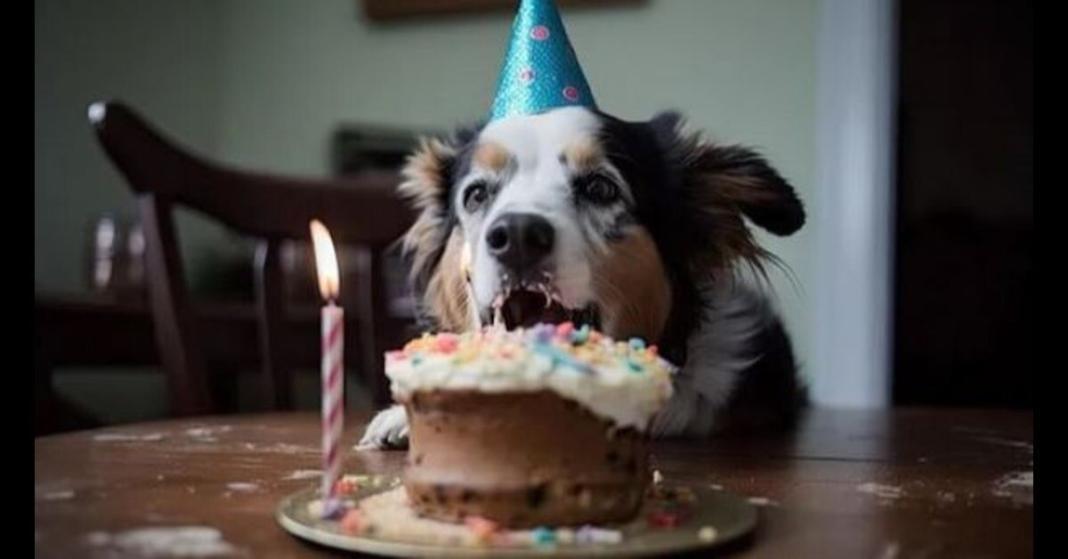Have you ever wondered if you can share a slice of cake with your furry friend? After all, dogs love to eat anything and everything, right? Well, not exactly. While it may be tempting to treat your dog with some cake, especially on special occasions, you may want to think twice before doing so.
In this blog post, we will explore the question: can dogs eat cake? We will look at the nutritional needs of dogs, the risks of feeding cake to dogs, the dog-friendly alternatives to cake, and tips on how to prevent your dog from eating cake. By the end of this post, you will have a better understanding of why cake is not a good idea for dogs, and how you can make your dog happy and healthy without compromising their diet.
The Risks of Feeding Cake to Dogs
Feeding cake to your dog can have several negative consequences for their health and well-being. Here are some of the main risks of giving cake to dogs:
Fondant poisoning: Fondant is a type of sugar paste that is often used to decorate cakes. It may look appealing to dogs, but it can be harmful to them if ingested. Therefore, it is important to keep fondant away from your dog and ask yourself: is fondant safe for dogs
Obesity and weight gain: Over time, your dog may gain weight and develop obesity because of the high sugar and fat content of the cake. Diabetes, heart disease, arthritis, and other major health issues can all be brought on by obesity.
Dental issues: Sugar may damage your dog’s teeth and gums, resulting in plaque buildup, tooth rot, and foul breath. Your dog’s appetite and quality of life may also be impacted by dental issues.
Toxic components: Several frequently used cake toppings and ingredients can be dangerous or even deadly to dogs. For instance, xylitol, alcohol, raisins, macadamia nuts, chocolate, and seizures can all result in vomiting, diarrhea, kidney failure, and even death in dogs.
Pancreatitis: An inflammation of the pancreas, pancreatitis can be brought on by cake. Dogs suffering from pancreatitis may have severe gastrointestinal discomfort, nausea, fever, and dehydration. If neglected, it can potentially result in organ failure and diabetes.
Digestive issues: Cake may induce gas, bloating, constipation, diarrhea, and other digestive disorders in your dog. These problems may cause discomfort and dehydration in your dog. They may also be a sign of a more significant underlying issue, like an intolerance or allergy.
Dog-Friendly Alternatives to Cake
There are many dog-friendly alternatives to cake that you can make or buy for your pup. Here are some examples:
Pumpkin balls: Using pumpkin, whole wheat flour, and egg, these are simple to prepare. Vitamin A and fiber content in pumpkin are beneficial to your dog’s eyesight and digestive system.
Sweet potato chews: A simple and wholesome snack, these are made by slicing and baking sweet potatoes. Vitamins and antioxidants included in sweet potatoes can strengthen your dog’s immune system.
Healthy cake mixes: Healthy Cake mixes can be purchased from stores and made with whole-grain flour instead of refined sugars or artificial components. Dogs can safely and enjoyably eat the yogurt-based frosting that comes with some of them.
How to Prevent Your Dog from Eating Cake?
If you want to prevent your dog from eating cake, you need to use a combination of management and training strategies. Here are some tips that you can follow:
Keep cake out of reach: Ensure that any cakes or baked products are stored in a safe place that is inaccessible to your dog. Keep cake off of counters, tables, and floors where your dog can readily get to them.
Avoid giving your dog table scraps: Refrain from offering your dog any human food that can be hazardous to them. This will just make your dog more likely to start stealing food from your plate or the trash can and begging for more.
Teach them the ‘leave it’ command: This is a helpful command that will assist you in preventing your dog from consuming something unhealthy. Treats or praise are good ways to teach your dog to obey you and leave an object alone.
Provide them with appropriate chew toys: Give them appropriate chew toys since dogs will occasionally consume objects out of boredom or irritation. Giving your dog lots of mental and physical stimulation as well as sturdy chew toys that will satiate their need to chew will help you prevent this.
Understanding a Dog’s Dietary Needs
Dogs need a balanced diet that provides them with the essential nutrients for their health and well-being. These nutrients include:
Protein: The building block of muscles, organs, skin, hair, and nails is protein. It also supports the creation of hormones, immunity, growth, and repair. Dogs require premium animal protein sources, like dairy, meat, eggs, and seafood.
Fat: For dogs, fat is a vital source of fatty acids and energy. It also supports brain function, healthy skin and coat, and the absorption of fat-soluble vitamins. Dogs require fats from both plants and animals, such as flaxseed oil, fish oil, chicken fat, and olive oil, which are both unsaturated and saturated.
Carbohydrates: Another fuel source for dogs is carbohydrates. They also contain fiber, which is good for the bowels and digestion. Complex carbs found in grains, fruits, and vegetables including rice, oats, apples, and carrots can be metabolized by dogs.
Vitamins: Organic substances known as vitamins aid in the body’s numerous metabolic functions. Additionally, they function as antioxidants, preventing harm to the cells. Dogs require vitamins A, B, C, D, E, and K, as well as vitamins that are soluble in fat and water.
Minerals: Inorganic elements, and minerals aid in the development of bones and teeth, muscular contraction, nerve transmission, and blood coagulation. In addition, they control pH, enzyme activity, and fluid equilibrium. Dogs require a variety of macro and microminerals, including iron, zinc, calcium, magnesium, phosphorus, and selenium.
Water: Since it makes up over 60% of a dog’s body weight, water is the most essential nutrient. It aids with circulation, digestion, waste removal, and temperature regulation. Dogs must always have access to clean, fresh water.
FAQ: Can Dogs Eat Cake?
- Can dogs eat cake safely?
Most cakes are not safe for dogs because they contain sugar, dairy, and potentially harmful ingredients like chocolate or artificial sweeteners. If you want to give your dog a treat, opt for dog-friendly cakes made with safe ingredients. - What happens if a dog eats cake?
If a dog eats a small amount of plain cake, it may not cause immediate harm, but too much sugar and fat can lead to obesity and digestive issues. If the cake contains toxic ingredients like chocolate, xylitol, or raisins, contact a vet immediately. - Is chocolate cake dangerous for dogs?
Yes! Chocolate is toxic to dogs and can cause symptoms like vomiting, diarrhea, rapid heart rate, and even seizures. Even a small amount of chocolate cake can be harmful. - Can dogs eat cake with frosting?
No, most cake frostings contain high amounts of sugar, dairy, and sometimes artificial sweeteners like xylitol, which is toxic to dogs. It’s best to avoid giving dogs any frosting. - Are there any dog-friendly cake recipes?
Yes! You can make a dog-friendly cake using ingredients like peanut butter (without xylitol), mashed bananas, pumpkin puree, and whole wheat flour. These are safer alternatives for dogs. - Can dogs eat vanilla cake?
While vanilla cake is not toxic, it still contains sugar, butter, and flour, which are not ideal for dogs. It’s best to avoid giving them human cake and choose a dog-friendly version instead. - What ingredients in cake are harmful to dogs?
Common harmful ingredients in cake include:
- Chocolate (toxic to dogs)
- Xylitol (a sugar substitute that can be fatal)
- Raisins & Grapes (can cause kidney failure)
- Too much sugar & fat (leads to obesity and diabetes)
- Can dogs eat cheesecake?
No, cheesecake contains dairy, which can upset a dog’s stomach, and often has high sugar and fat content, which is unhealthy for dogs. - What should I do if my dog eats cake?
If your dog eats a small amount of plain cake, monitor them for any digestive upset. If they eat cake with chocolate, xylitol, or raisins, call a veterinarian immediately. - What are some healthy alternatives to cake for dogs?
Instead of cake, you can treat your dog with:
- Sliced apples (without seeds)
- Carrot sticks
- Plain cooked pumpkin
- Homemade dog biscuits made with peanut butter and oats
Conclusion
In conclusion, cake is not a suitable treat for dogs, as it can cause various health problems and even be fatal in some cases. Dogs have different dietary needs than humans, and they need a balanced diet that provides them with the essential nutrients for their well-being. Therefore, it is important to avoid giving cake to your dog and opt for dog-friendly alternatives instead.
You can also prevent your dog from eating cake by keeping it out of reach, not feeding table scraps, teaching the ‘leave it’ command, and providing appropriate chew toys. By following these tips, you can ensure that your dog stays happy and healthy and that you can enjoy your celebrations together without any worries.
You may also like,







